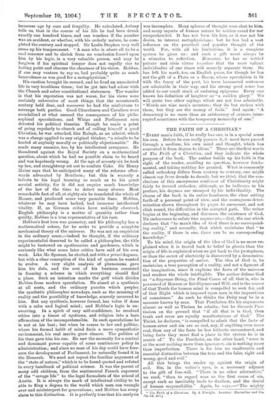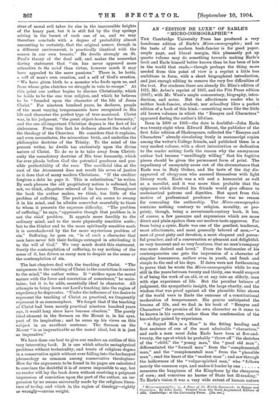THE FAITH OF A CHRISTIAN.*
"EVERY man's faith, if he really has one, is in a special sense his own. Before he can really possess it, it must have passed through a medium, his own mind and thought, which has converted it from dogma to idiom." These are the first words of The Faith of a Christian, and they indicate the whole purpose of the book. The author builds up his faith in the sight of the reader, avoiding no question, however funda- mental, and taking nothing for granted. What is commonly called orthodoxy differs from century to century, one might almost say from decade to decade, but we think that the con- clusions of this anonymous confessor of Christianity might fairly be termed orthodox, although, as he indicates in his preface, his dogmas are stamped by his individuality. The charm of the book is its entire frankness, the clear setting forth of a personal point of view, and the courageous deter- mination shown throughout its pages to surmount, and not slink round, the difficulties in the accepted path. The writer begins at the beginning, and discusses the existence of God. He endeavours to refute two arguments,—first, the one which declares that "to man's idea of God there is no correspond- ing reality," and secondly, that which maintains that "to the reality, if there is one, there can be no corresponding knowledge."
To his mind, the origin of the idea of God is no more ex- plained when it is traced back to belief in ghosts than the origin of life is explained when we get back to the protoplasm, or than the secret of electricity is discovered by a demonstra- tion of the properties of amber. The idea of God is, he maintains, a true perception of a reality, and not a figment of the imagination, since it explains the facts of the universe and renders the whole intelligible. The author defines God as "a Supreme Being, the Final Cause of all that is, who is possessed of Reason or Intelligence and Will, and is the source of that Truth the human mind is compelled to seek for, and of that Right which is imposed upon man in the imperatives of conscience." As such he thinks the Deity may be in a measure known by man. That Pantheism fits his arguments almost as well as Theism be admits ; but be discards Pan- theism on the ground that "if all that is is God, then truth and error are equally manifestations of God." The Theist, he declares, "is compelled to admit that the facts of human error and sin are as real, nay, if anything even more real, than any of the facts he has hitherto encountered, and being facts they must find a place in the system be is in search of." To the Pantheist, on the other hand, "error is at the most nothing more than ignorance, sin is nothing more than imperfection. There is for him no unalterable and essential distinction between the true and the false, right and wrong, good and evil." All this brings the reader up against the origin of evil. Sin, in the writer's eyes, is a necessary adjunct to the gift of free-will. "There is no other alternative," we read, "than to regard man as the first cause of sin, except such as inevitably leads to dualism, and the denial of human responsibility." Again, be says :—" The mighty
" The Faith of a Christian. By 4. Disciple. Loudon: Macmillan tuul Co. r3s.ed. net.]
river of moral evil takes its rise in the inaccessible heights of the hoary past, but it is still fed by the tiny springs arising in the breast of each one of us, and we may therefore conclude with a degree of probability almost amounting to certainty, that the original source, though in a different environment, is practically identical with the source in our own breasts." He dwells strongly on St. Paul's theory of the dual self, and makes the somewhat daring statement that "sin has never appeared more attractive to the mind than virtue, however much it may have appealed to the mere passions." There is, he holds, a self of man's own creation, and a self of God's creation. "We have given birth to a monster who feeds upon us, and from whose grim clutches we struggle in vain to escape." At this point our author begins to discuss Christianity, which be holds to be the one true religion, and which he believes to be "founded upon the character of the life of Jesus Christ." For nineteen hundred years, he declares, people of the most varying temperaments have recognised in His life and character the perfect type of true manhood. Christ was, in his judgment, "the great object-lesson for humanity," and the one all-important Christian dogma is the fact of his sinlessness. From this fact he deduces almost the whole of the theology of the Churches. He considers that it explains, and even necessitates, the miraculous birth, and underlies the philosophic doctrine of the Trinity. To the mind of the present writer, he dwells too exclusively upon the divine nature of Christ. To do so is to take away from Christi- anity the consolatory doctrine of His true humanity, which for ever pleads before God the potential goodness and pos- sible perfectibility of the race. The sacrificial idea at the root of the Atonement does not revolt his sense of justice as it does that of many modern Christians. "If the creditor forgives a debt he pays it. This is substitution," he writes. By such phrases the old propitiatory notion is softened, but not, we think, altogether relieved of its horror. Throughout the book the author makes, we think, too little of the problem of suffering. The problem of sin seems to swamp it in his mind, and he alludes somewhat scornfully to those to whom it presents the supreme difficulty. "The problem of suffering," he says, "oppressive though that problem is, is not the chief problem. It appeals more forcibly to the ordinary mind, and to the more physically sensitive souls ; but to the thinker and to the more spiritually sensitive souls it is overshadowed by the far more mysterious problem of sin." Suffering, he goes on, is of such a character that men have never felt their feelings outraged in attributing it to the will of God." We very much doubt this statement Surely the contemplation of suffering, to say nothing of the sense of it, has driven as many men to despair as the sense cr the contemplation of sin.
The last chapters deal with the teaching of Christ. "The uniqueness in the teaching of Christ is the conviction it carries to the mind," the author writes. It "strikes upon the moral nature with the force and conviction of conscience," he main- tains; but it is, he adds, essentially ideal in character. All attempts to bring down our Lord's teaching into the region of expediency he deprecates. "Under the influence of the desire to represent the teaching of Christ as practical, we frequently represent it as commonplace. We forget that if the teaching of Christ had been merely practical nineteen hundred years ago, it would long since have become obsolete." The purely ideal element in the Sermon on the Mount is, in his eyes, part of its inspiration ; and he sums up his views on this subject in an excellent sentence. The Sermon on the Mount "is as impracticable as the moral ideal, but it is just as imperative."
We have done our best to give our readers an outline of this very interesting book. It is one which attacks metaphysical problems without technicality, and treats of religious dogma in a conservative spirit without ever falling into the hackneyed phraseology so common among conservative theologians. How far the arguments to be found in its pages are calculated to convince the doubtful it is of course impossible to say, but no reader will lay the book down without receiving a poignant impression of conviction upon the part of the author, an im- pression by no means universally made by the religious litera- ture of to-day, and which in the region of theology—rightly or wrongly—carries weight.



































 Previous page
Previous page